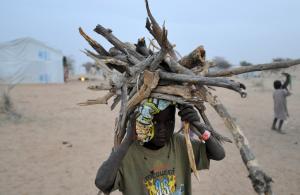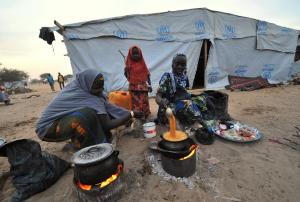Baga Sola (Chad) (AFP) - Lying on his side, Moussa Zira shows the gaping wound where the bullet entered his thigh the night Boko Haram came to his village near the now devastated northern Nigerian town of Baga.
He pretended to be dead before escaping in a dug-out canoe across Lake Chad to a refugee camp. He is still in terrible pain and has a limp, but Moussa Zira knows it is a miracle he survived what many fear was the worst massacre of the Islamists' bloody insurgency.
"Boko Haram arrived at four in the morning and entered every hut, looking for the men. They greeted us and told us to follow them into the bush, where they would explain everything," he said.
The fighters took 14 men -- "one per house" -- from his village near Baga. "There was an old man with us and they told him to leave. We walked to a field and they told everyone to lie face down on the ground.
"After firing in the air once, they started shooting us" at point-blank range. Moussa Zira thought it was all over, that he was dead. "Then I realised that the bullet had missed my head and had gone through my arm and the back of my thigh. But around me everyone was dead."
He lay still among the bodies so that the fighters "would not finish me off" until the gunmen left, before crawling through the tall grass for hours before coming across a motorcyclist who helped him get to the lake and away to Chad.
View gallery

A Nigerian refugee child carries wood in a United Nations Refugee Agency (UNHCR) refugee camp in Bag …
- 'A terrible loneliness' -
Pastor Yacubu Moussa, 43, is one of the very few Christians to have escaped the attack on Baga. The town was asleep when Boko Haram arrived on the night of January 3.
"They started firing at everyone indiscriminately -- men, women, little children, even the old," he said.
Asked how many fighters had attacked the town, he hesitated and talked of "thousands of men", a number that is impossible to verify. But the pastor is sure about one thing: "There were bodies everywhere in the streets" when he fled for his life.
Ten days later, he tried to go home to get some of his possessions. Hiding in the bush, he saw "bodies floating on the water" of the lake. "The smell was so strong it stank from very far away."
View gallery

Nigerian refugee women cook in a United Nations Refugee Agency (UNHCR) refugee camp in Baga Sola by …
He confirmed that there is not much left of Baga. "They burned everything, our houses, ours shops, even the motorbikes."
It's at Muslim prayer times when the terrible loneliness of being almost the sole Christian survivor of the massacres hits home, as his neighbours in the camp kneel to face Mecca. "Here I have nothing to do. I don't have a congregation left, I have no place of worship, not even a Bible."
Since the beginning of January more than 14,000 people have fled over the Nigerian border into Chad to escape the bloody attacks around Baga, according to Mamadou Dian Balde, of the UN's refugee agency.
According to international rights groups, Boko Haram razed the town and slaughtered hundreds of people, if not more.
- 'Stories too hard to hear' -
"They arrive with stories that are too hard to listen to," said refugee worker Idriss Dezeh of the survivors. "The other day a man arrived to be registered but he didn't seem to hear anything I was saying to him. Then he started to cry. Boko Haram threw a grenade into his house, killing his wife and his three children."
Some though were lucky enough to get out alive with their children. Sitting in front of a white tent in the refugee camp in Baga Sola, Aisha Aladji Garb breastfeeds her tiny baby. Two weeks ago she gave birth to the baby boy in a canoe after fleeing Boko Haram.
She was found by a patrol of Chadian troops after reaching their side of the lake. "They took care of me and carried me onto their truck and took me to the camp where I got help.
"It is thanks to them that my baby is alive," she said with a proud smile. "That's why I have called him Idriss Deby" after the president of Chad.